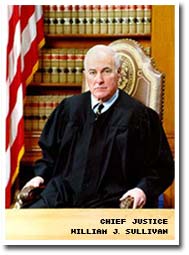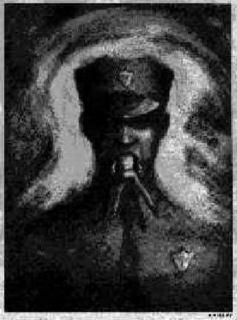
By Kevin Fleming
Mental Floss(
Mental Floss) -- Because you weren't going into botany, the priesthood, or coin manufacturing, you thought you were safe to dismiss Latin as a dead language. Obviously, you didn't graduate cum laude.
Latin is about as dead as Elvis (who, by the way, made $54 million in 2004).
Whether you're deciphering a cryptic state seal or trying to impress your Catholic in-laws, knowing some Latin has its advantages. But the operative word here is "some."
The ability to translate The Aeneid probably isn't going to come in handy anytime soon, so we'll start you off with 9 phrases that have survived the hatchet men of time (in all their pretentious glory).
Caveat Emptor: (KAV-ee-OT emp-TOR): "Let the buyer beware"
Before money-back guarantees and 20-year warranties, caveat emptor was indispensable advice for the consumer.
These days, it'd be more fitting to have it tattooed on the foreheads of used-car salesmen, infomercial actors, and prostitutes.
For extra credit points, remember that caveat often makes solo appearances at cocktail parties as a fancy term for a warning or caution.
Oh, and just so you know, caveat lector means "let the reader beware."
Persona Non Grata: (puhr-SOH-nah non GRAH-tah): "An unacceptable person"
Remember your old college buddy, the one everybody called Chugger? Now picture him at a debutante ball, and you'll start to get a sense of someone with persona non grata status.
The term is most commonly used in diplomatic circles to indicate that a person is unwelcome due to ideological differences or a breach of trust.
Sometimes, the tag refers to a pariah, a ne'er-do-well, a killjoy, or an interloper, but it's always subjective.
Michael Moore was treated as a persona non grata at the Republican National Convention. Bill O'Reilly would experience the same at Burning Man.
Habeas Corpus: (HAY-bee-as KOR-pus): "You have the body"
When you wake up in the New Orleans Parish Prison after a foggy night at Mardi Gras, remember this one.
In a nutshell, habeas corpus is what separates us from savages. It's the legal principle that guarantees an inmate the right to appear before a judge in court, so it can be determined whether or not that person is being lawfully imprisoned.
It's also one of the cornerstones of the American and British legal systems. Without it, tyrannical and unjust imprisonments would be possible.
In situations where national security is at risk, however, habeas corpus can be suspended.
Cogito Ergo Sum: (CO-gee-toe ER-go SOME): "I think, therefore I am"
When all those spirited mental wrestling matches you have about existentialism start growing old (yeah, right!), you can always put an end to the debate with cogito ergo sum.
René Descartes, the 17th-century French philosopher, coined the phrase as a means of justifying reality. According to him, nothing in life could be proven except one's thoughts. Well, so he thought, anyway.
E Pluribus Unum: (EE PLUR-uh-buhs OOH-nuhm): "Out of many, one"
Less unique than it sounds, America's original national motto, e pluribus unum, was plagiarized from an ancient recipe for salad dressing.
In the 18th century, haughty intellectuals were fond of this phrase. It was the kind of thing gentlemen's magazines would use to describe their year-end editions.
But the term made its first appearance in Virgil's poem "Moretum" to describe salad dressing. The ingredients, he wrote, would surrender their individual aesthetic when mixed with others to form one unique, homogenous, harmonious, and tasty concoction.
As a slogan, it really nailed that whole cultural melting pot thing we were going for. And while it continues to appear on U.S. coins, "In God We Trust" came along later (officially in 1956) to share the motto spotlight.
Quid Pro Quo: (kwid proh KWOH): "You scratch my back, I'll scratch yours"
Given that quid pro quo refers to a deal or trade, it's no wonder the Brits nicknamed their almighty pound the "quid."
And if you give someone some quid, you're going to expect some quo.
The phrase often lives in the courtroom, where guilt and innocence are the currency. It's the oil that lubricates our legal system.
Something of a quantified value is traded for something of equal value; elements are parted and parceled off until quid pro quo is achieved.
Most recently, Arizona Senator John McCain co-opted the phrase to describe campaign finance and influence pedaling because he believes that one doesn't give major milk to a campaign without expecting major cheese in return.
Ad Hominem: (ad HAH-mi-nem): "To attack the man"
In the world of public discourse, ad hominem is a means of attacking one's rhetorical opponent by questioning his or her reputation or expertise rather than sticking to the issue at hand. Translation: Politicians are really good at it.
People who resort to ad hominem techniques are usually derided as having a diluted argument or lack of discipline. If pressed, they'll brandish it like a saber and refuse to get back to the heart of the matter. Who said the debate team doesn't have sex appeal?
Ad Majorem Dei Gloriam: (ad-MA-yor-em DAY-ee GLOR-ee-um): "All for the Greater Glory of God"
Ad majorem dei gloriam is often shortened to AMDG. In other words, it's the WWJD of the Jesuits, who've been drilling the mantra into their followers since (Saint) Ignatius of Loyola founded the Catholic Order in 1534. They believe all actions, big or small, should be done with AMDG in mind.
Remind your Jesuit-educated buddies of this when they seem to be straying from the path. (Best used with a wink and a hint of irony.)
Sui Generis:(SOO-ee JEN-er-is): "Of its own genus," or "Unique and unable to classify"
Frank Zappa, the VW Beetle, cheese in a can, that feeling you get when the Red Sox win the World Series: Sui generis refers to something that's so new, so bizarre, or so rare that it defies categorization.
Granted, labeling something "sui generis" is really just classifying the unclassifiable. But let's not over-think it. Use it at a dinner party to describe Andy Kaufman, and you impress your friends. Use it too often, and you just sound pretentious. E-mail to a friend E-mail to a friend
For more mental_floss articles, visit mentalfloss.com









